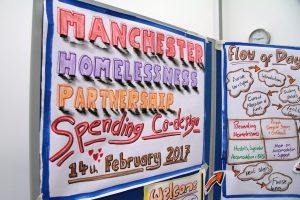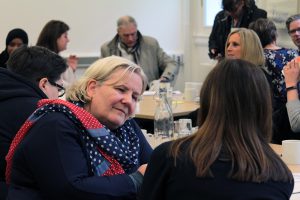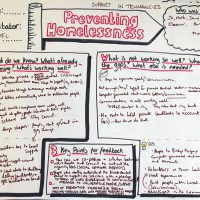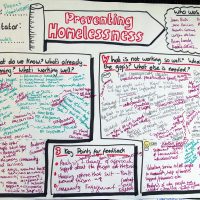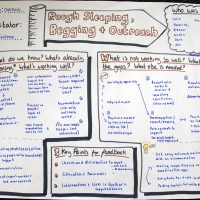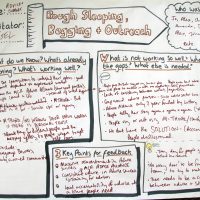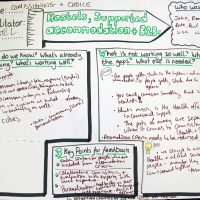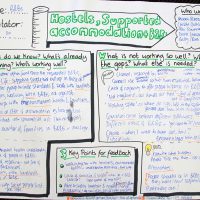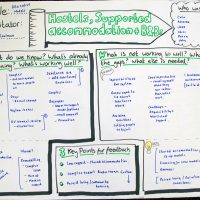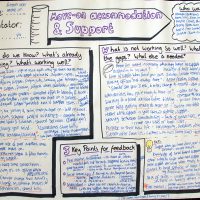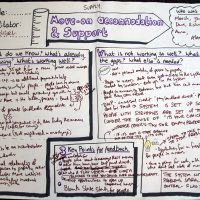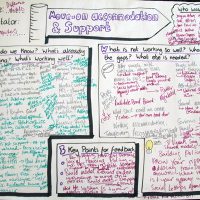A key part of Manchester City Council’s pledge to the Homelessness Charter last May was “to involve people with experience of homelessness in the development of new models of delivery and decisions about homelessness services.” This Valentine’s Day marked an important step in the deepening relationship between MCC and those who use its homelessness services, as over 40 people gathered for an exciting purpose: to start the process of co-designing new homelessness services for Manchester. MCC have managed to secure at least £1M of additional funding towards homelessness services, and this event was the first step in working together to discuss how it will be spent.
Representatives attended from homelessness charities, Manchester City Council, supported accommodation and housing providers, outreach teams, drugs services, grassroots & faith groups and, crucially, eight people with lived experience of homelessness.
Former rough sleeper and member of the Booth Centre’s Arts Committee, Danny Collins, welcomed everyone, and we then started the day with a reminder of the values and principles of co-productive working. Inspiring Change Manchester’s Mark Jepson used his personal experience of regularly trying to navigate sector jargon to remind us all to use Plain English and to be as inclusive as possible in our discussions.
Hazel Summers, MCC’s Strategic Director for Adult Social Services, then addressed the room, giving an overview of the (yet to be finalized) funds from recent successful bids to central government, to be used for working with both new and entrenched rough sleepers. She then spoke of the additional funds for homelessness services within the city centre, which will total at least £1 million, and which can be accessed from April 2017.
For the rest of the day we looked at specific areas of homelessness to identify what is already happening and working well, and where gaps exist. The day was divided into four themes, together providing an overall picture of homelessness.
Firstly we looked at preventing homelessness, both for those who are caught in cycles of repeat homelessness, and for people who have never been homeless before. We then talked about the need for permanent, secure places to call home, and how we can provide enough different options for everyone. Thirdly there were discussions about begging, rough sleeping and outreach teams; and finally, conversations about temporary and supported types of accommodation.
Participants worked across four facilitated tables, each discussing what else they would like to see happening to fill the gaps between existing services, or to work more innovatively or effectively together. There was a strong emphasis throughout the day on having a far more person-centred approach to all that we do. Facilitators kept a written record of each conversation, and then fed back the content of their table’s discussion to the rest of the room.
The day was summed up by the Booth Centre’s CEO, Amanda Croome, who spoke about some of the next steps we could take, with an emphasis on working hard to meaningfully engage many more people who are or have been homeless every step of the way.
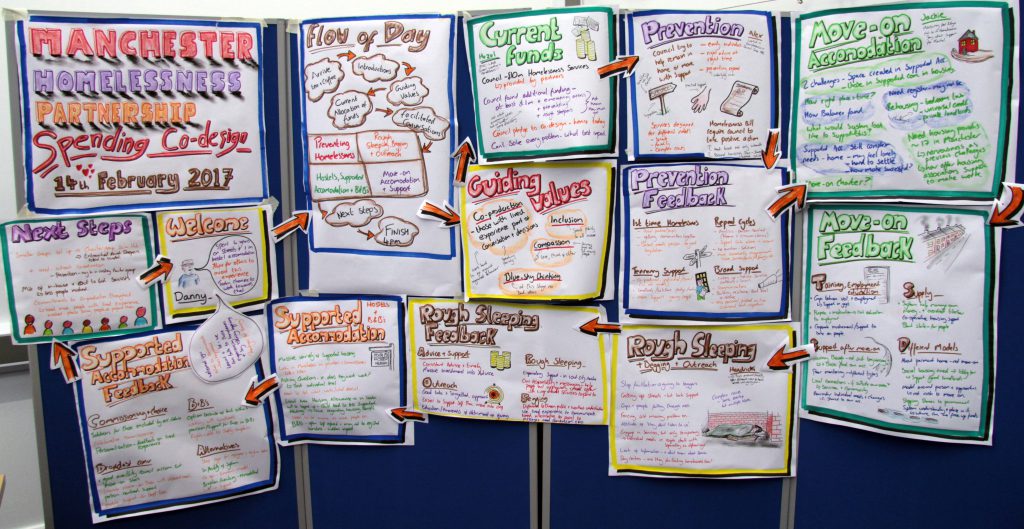
Below are the key outputs from the day…
Homelessness prevention
 New to homelessness
New to homelessness
- Partnerships with independent local agencies, community based and specific.
- A clearer way to obtain advice with community – GPs, schools, landlords, other front line services.
- Support in PRS e.g. social lettings agency. Always based on need not legislation.
Repeat homelessness
- Sharing of background information to inform a change of approach in frontline services and commissioning.
- Housing options available to suit that individual.
- Community engagement to combat social isolation.
Support in tenancies
- Co-produce solutions between individuals and council to cut out the agency fees in private sector. One example could be a social lettings agency.
- Legal advice to challenge dodgy landlords – can we shape a pledge from a solicitor firm to help with this – legal services. Or (more importantly) the legal people to train up people with lived experience to help communicate the message to vulnerable people (more likely to listen than to a solicitor).
- Ways of preventing vulnerable person falling through the gaps with housing association – letters and support.
Support services
- Create better link ups between public sector, third sector and voluntary/grassroots organisations to provide a more holistic understanding of what is on offer and provide the infrastructure, systems and communications to facilitate it.
- Build resilience at local authority level, especially supporting people where they were born and still live, through local support hubs.
- Make the system more personal through face to face support, helping challenge the difficulty of people asking for help, making access systems more simplistic and channelling funding from local givers to support the process (rather than lose to begging).
Other ideas
- Using local volunteers and services for advice giving
- Expand centrepoint prevention service model to over 25s
- A fund for agencies to use to support people to stay in their tenancies
- Working across local authority boundaries – people don’t always want to get advice in their local area
- Better end of SWEP support – e.g. out of hotels into supported housing
- “Warm handovers” – something that could change now. Where the individual receiving the support is taken to the new place to meet the landlord or support worker (a move away from disjointed working)
- Private Rented Sector access – paperless bond and Rent In Advance schemes
- Using Discretionary Housing Payments for bonds and Rent In Advance
Rough sleeping, begging and outreach
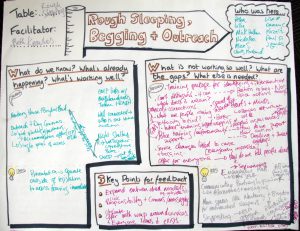 Rough sleeping
Rough sleeping
- Expand entrenched models like (Newbury House and Brydon Count) and create pathways for people rough sleeping outside the city centre
- City centre offer with wrap around services and wide awareness of what it does
- Civic responsibility – general public, services and business all knowing info, messages, services etc
Outreach
- Layer in intervention support at accommodation and SWEP, so people are better supported before they go back on to the street.
- Better links between outreach workers and all accommodation providers – clear expectations, targeted solutions to cover all scenarios.
- Tackle personal giving to remove the disincentive to move away from rough sleeping.
Advice and Support
- Massive reinvestment in advice services, including mental health.
- Consistent advice in advice services similar to Manchester Advice Alliance
- Local accessibility of advice services at the time and place that people need.
Begging
- Clear and strong messages that giving money effects people’s health, life expectancy and puts them off accessing services. Without judgement, with compassion.
- Alternative giving messages coming for people with lived experience.
- Balancing alternatives with enforcement.
Other ideas
- Create a “tent safe area” where tents won’t be disposed of but there’s an understanding that people there will work with accommodation services
- Police and outreach partnership (“friendly face” of enforcement)
- Central rough sleeper outreach number for GM, diverted to the relevant council
- Drug rehab early and persistent – e.g. outreach & residentials such as Teen Challenge
- Accommodation that can be paid for by the public rather than giving on the street
- Clearer governance and referral process for rough sleepers – transparent so that public services and rough sleepers themselves are aware
- Better information focused on the person and their needs – e.g. history of rough sleeping, exclusions or challenges for getting them off the streets
- Analysis of people rough sleeping – e.g. mental health, disability, risk of exploitation, etc.
- Increase outreach with resources to provide an offer to all who are rough sleeping and/or begging in the city
Hostels, supported accommodation, B&Bs
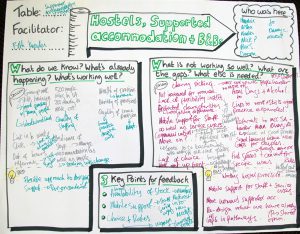 Supported accommodation
Supported accommodation
- Good availability of supported accommodation stock – moved on more effectively and quicker into social housing to free up spaces for specific groups e.g. women
- Mobile support for staff and service users
- More choice and less rules!
B&Bs
- Working together with landlords and environmental health – understand the experience of residents (two way process).
- Better provision, connection and support when in B&B, not feeling lost in the system – “ loss of control over my life”.
- Rights of residents – ability to safely complain and request changes.
Alternative models
- For low support needs, shared accommodations, co-operative models working hostels and models like Emmaus would be ideal and we need more
- For more complex needs, remodelling existing models to become more specialist and integrating support services into the model, like Newbury House and Brydon Court would be ideal
- For “awkward” needs, paired living, community housing like Cornerstones or even business partnerships with brands like AirBnB would be ideal prior to move on (though relationship and assessment dependent)
Commissioning and choice
- Finding solutions for people who are excluded from accommodation criteria (ensuring there are no gaps in the market) e.g. for someone with an arson record.
- Collaborative commissioning and evaluation with experts with lived experience
- Personalisation of services – service users feeding back if it is working for them and defining their own personalised service (not the provider defining this).
Other ideas
- We have a family support team for families in B&Bs – what about single people and childless couples?
- Local community connectors (with knowledge of all the things to do and ways to help)
Move on accommodation and support
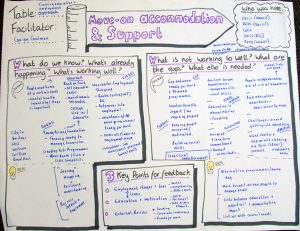 Supply
Supply
- Flag system so that issues don’t spiral out of control, e.g. rent arrears because of DWP money going to individual but not getting passed on – if there was a flag system (like an overdraft limit), then a personal approach could be used to address it or move it to a direct payment system.
- Develop opportunities to open up co-op housing so people can live together (multiple occupancy).
- Blank slate for people – past record not a blocker.
Different models
- Social housing policy – increased investment, include opening up private rented sector (increased security & regulation, support for landlords)
- Build the model around the person – flexible, taking away pressure to move on, stepping stones into the community, build relationships and roots
- Enabling people to know “What the system is and your agency within it”
Training, education and employment
- Linking in socialising opportunities and feeding into voluntary experiences provides the step change needed to move people along the path to work
- Working on purpose identification, motivational exercising and education/employment path mapping will help keep people focused and paint a clearer picture of impact.
- Working with businesses to explore external barriers like stigma and support needed to help people be ready for work may support addressing the problem.
Support after moving on
- Peer mentors throughout journey – from early stage through to move on and as needed later. Paid jobs for peer mentors.
- Local connections and things to do beyond the basics – health, purpose, hobbies (peers, community, volunteers).
- Individual needs – getting the support you need, move when you are ready to move on and choices later if you change your mind. Floating support.
Other ideas
- Must make sure there are sufficient accessible mental health and substance misuse services in the community!
- Bring back mental health, substance misuse and needle exchange services & reduce waiting lists
- Communicating local need for support – bring in volunteers & community groups
- Increase access to Private Rented Sector through lettings agency
- Getting more creative in exploring and developing permanent home options for people – single, shared, PRS, Housing First, co-operatives, links to recovery communities, etc.
- Longer-term accommodation is needed for more chaotic clients, to remove pressure for move-on accommodation and reduce their risk of returning to the streets
- Remove referral criteria for entrenched rough sleepers accommodation & allow a longer stay to ensure people are ready to move onto tenancy and community
- Resettlement to be based around the person – holistic, community-focused, etc
To find out more about Manchester Homelessness Charter visit charter.streetsupport.net
#EndHomelessnessMCR

